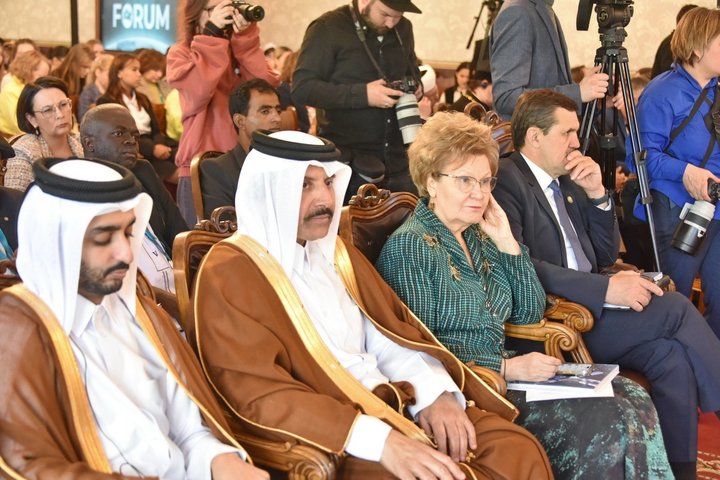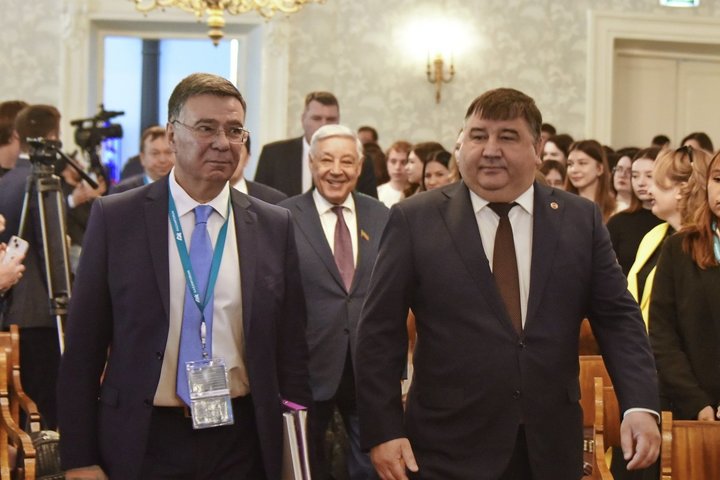Farid Mukhametshin about UNESCO sites as an incentive for development: ‘We take full advantage of these opportunities!’
The head of the parliament of the Republic of Tatarstan said at KazanForum that the ignorance of the Russian language by foreign students leads to a decline in the prestige of the Kazan federal University in their homeland
The role of World Cultural Heritage in the development of regions was discussed in the Imperial Hall of the Kazan Federal University by participants of the XV Russia — Islamic World: KazanForum International Economic Forum. The panel discussion on this topic was opened by the head of the Tatarstan parliament, Farid Mukhametshin, who in a brief introductory speech reflected almost all aspects of the topic under discussion. Read the details in the material of Realnoe Vremya.
“This is an important victory”
At the beginning of the meeting, Chairman of the State Council of the Republic of Tatarstan Farid Mukhametshin recalled: this year Russia celebrates our country's entry into the United Nations Organisation for Science and Culture — UNESCO.
“In modern geopolitical conditions, the mission of this respected organisation to strengthen peace and sustainable development of intercultural dialogue is becoming relevant. In recent years, through the efforts of colleagues from the Ministry of Foreign Affairs of Russia, the country's permanent Mission to UNESCO, and the Russian Commission for UNESCO, it has been possible to build a constructive dialogue on the fundamental issues of the organisation's field of activity," he stressed.
As an example, Farid Mukhametshin cited the event of last autumn — the inclusion of the KFU Astronomical Observatory in the List of UNESCO Cultural Heritage Sites:
“This is an important victory, our pride and responsibility to future generations... Previously, the historical and architectural ensemble of the Kazan Kremlin, the Bulgarian Historical and Archaeological Complex, the Assumption Monastery and the cathedral of the island-city of Sviyazhsk were included in the UNESCO World Heritage List.
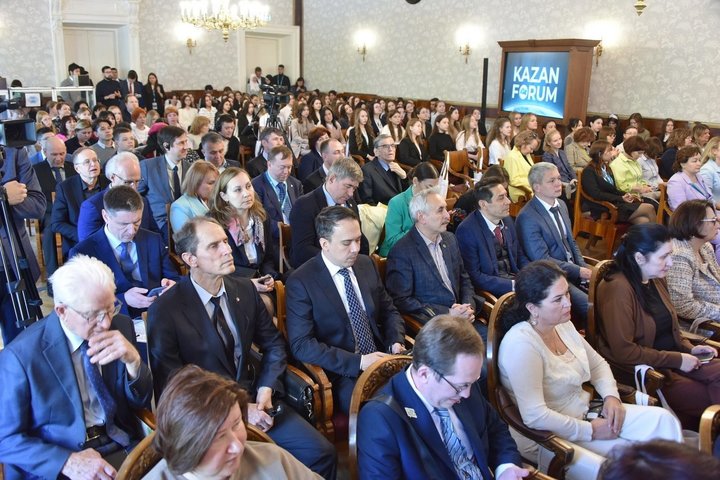
This was preceded by extensive and responsible work on the preservation and restoration of these monuments, “combining the efforts of science and culture based on significant educational potential”. Farid Mukhametshin stressed that by holding major events such as the SCO, BRICS, BRICS+ summits, sports competitions, and hosting their guests, Kazan has something to boast about — to show this cultural heritage, “a pillar in the education of our people”. He also pointed out that it would be impossible to carry out work on its preservation on such a scale in the absence of support from the federal centre.
For this, Mukhametshin thanked Deputy Minister of Foreign Affairs of the Russian Federation Alexander Pankin, Deputy Director of the Department for Multilateral Humanitarian Cooperation and Cultural Relations of the Ministry of Foreign Affairs of the Russian Federation Tatyana Dovgalenko who attended the meeting and, in absentia, Minister of Culture of Russia Olga Lyubimova.
He also expressed gratitude to those countries of the Islamic world that “have supported our initiatives to include our monuments among the World Cultural Heritage sites over the years”, and added:
“For us, this is pride, this is respect for antiquity, for history, and through these works we do a lot of educational, cultural and spiritual work. We take full advantage of these opportunities.
About main values
“We are a multinational people — 174 nations and nationalities," said Farid Mukhametshin. “Everyone wants to preserve their culture, their language, their traditions, their customs, believing that it is a God-given duty to teach children and grandchildren who live in Tatarstan. How to do this job — we found a tool. We have created the institution such as the House of Friendship of the Peoples of the Republic of Tatarstan, the Assembly of the Peoples of the Republic of Tatarstan, and foreigners living compactly in our republic in the past, people of different nationalities united in national and cultural autonomies and joined the assembly. Through this structure, we carry out serious work with them and are glad that we are making some progress in this direction.
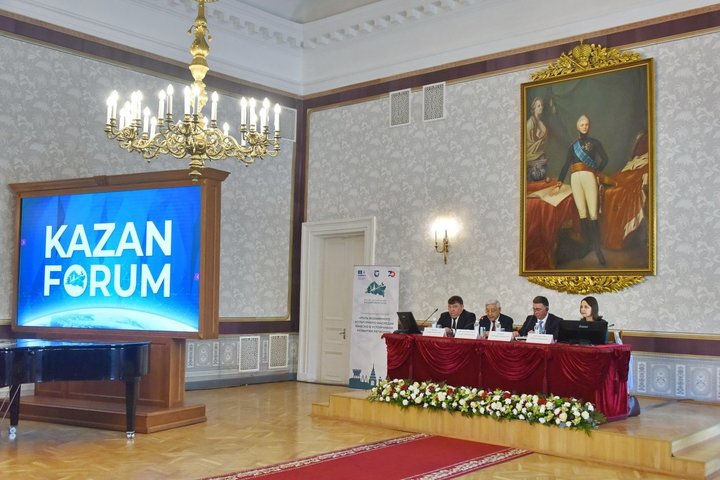
In his speech, the chairman of the State Council of Tatarstan touched upon the values that are paramount in preserving the cultural and national identity of the Tatar people:
“A thousand years ago, our ancestors voluntarily adopted Islam in Bolgar. Unlike those subjects where this religion was forced to be adopted by force, our great-grandfathers adopted it, and [since then] we have been very friendly neighbours with other peoples.
Farid Mukhametshin noted that cult and religious centres open up new opportunities for the preservation of cultural values, contrasting the position of the Soviet state, which separated religion from the state, with the modern view of the interaction of secular and spiritual authorities:
“Today we realise that this is God-given, it must be supported and conditions for development must be created. No religion calls for bad things, not one!
A little later, he turned to the problem of the loss of a factor no less powerful than religion, the preservation of national identity and culture:
“The aging and numerically decreasing rural population, migration to cities, to republican universities, when parents say: 'Son, go to university in Kazan and please don't come back, find a job there!' This is a new challenge. We must preserve the rural population, and not only because it feeds us, but also because the traditions of each nation are better preserved in the countryside. They preserve the language, clothes, cuisine, and spoken language there! Therefore, we value the villager.
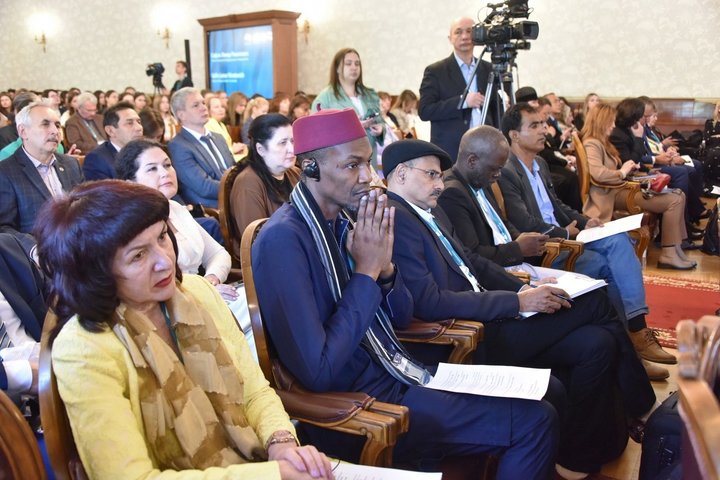
Different sides of tourism
The head of the republican parliament came close to the topic of discussion — the role of World Cultural Heritage sites in the development of regions, pointing out that their presence on the territory of Tatarstan ensures the economic development of the republic, since transport and tourist infrastructure is created around them, and entrepreneurship develops.
“Over a million tourists and pilgrims visit these places of worship every year.”
Then he pointed out the problem of, so to say, “educational tourism”: 52 thousand students from other countries study at the KFU, but most of them do not know or know very little Russian, which is used as a teaching language. As a result, having not fully mastered the university's programme, “they do not understand everything, cannot present the studied material and lose the prestige of the KFU when they return to their homeland [as specialists].”
“We work with the Ministry of Education of the Russian Federation, with the Ministry of Foreign Affairs. I would like them to come to us with at least a basic knowledge of the Russian language. We need to think about this, it is an issue that requires our common attention.
Welcoming the participants of the panel discussion, the Guest of Honour, Deputy Minister of Foreign Affairs of the Russian Federation Alexander Pankin, stressed that efforts to preserve the World Cultural Heritage “are aimed at preserving the culture of Tatarstan”:
“The UNESCO World Heritage List has been formed for more than half a century… It is important to preserve it with dignity, to always be on this list is a priority task of international cooperation, and the topic of conversation chosen today is more relevant than ever — the interests of tourists, investors, public and scientific circles are intertwined here. It is a magnet for tourism, as well as creative, scientific, and public. Since there are trips, visits, then an infrastructure is required in which the subject is invested, and when there is infrastructure, interesting points of attraction, then investments go into completely different industries, and this is the goal of sustainable development.”
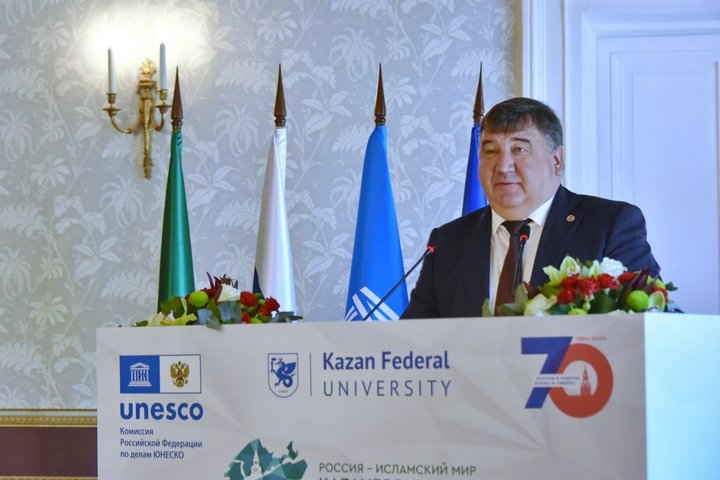
Past achievements and future plans
Before the panel discussion, KFU Rector Lenar Safin greeted the participants and solemnly presented the regalia of the Honourary Doctor of the University to the Ambassador Extraordinary and Plenipotentiary of the Republic of Qatar to the Russian Federation Ahmed bin Jassim Al Thani for services to the development of cultural relations between states and universities.
Then the speakers — Secretary General of the Malian National Commission for UNESCO Diallo Kadia Maiga, Head of the Department of Culture of the Special Province of Indonesia Yogyakarta Prativ Diana Lakshmi and other participants in the panel discussion briefly spoke about the World Cultural Heritage sites in their countries.
Before the participants of the discussion moved on to a detailed discussion of the problem proposed in its title, a draft decision was announced, which should be the result of the meeting. Tatarstan proposed as such a solution to determine the topic of the same panel discussion in 2025 — the key aspects of nominating unique natural sites to the World Cultural Heritage List, and as a contribution of the republic — to plan a separate section “Volga-Kama Reserve — a unique pristine natural object of the East of the European part of Russia”.
